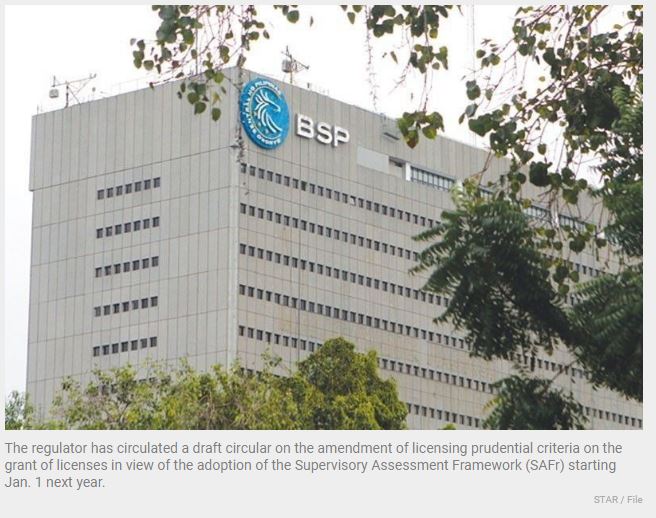Philippines: BSP amends licensing criteria
MANILA, Philippines — The Bangko Sentral ng Pilipinas (BSP) is finalizing the changes to the licensing prudential criteria in view of the deployment next year of a more forward-looking rating system in assessing the compliance of banks and other financial institutions in mitigating business risk.
The regulator has circulated a draft circular on the amendment of licensing prudential criteria on the grant of licenses in view of the adoption of the Supervisory Assessment Framework (SAFr) starting Jan. 1 next year.
The SAFr would replace the CAMELS (capital adequacy, asset quality, management earnings, liquidity, and sensitivity to market risk) and the ROCA (risk management, operational controls, compliance and asset quality) rating systems.
The proposed changes will be used to determine the eligibility of applicants for the licenses or authorities granted by the BSP.
Under the proposed amendments, applicant banks should have an SAFr composite rating of at least three and should have no major supervisory concerns in governance, risk management systems, internal controls and compliance system that may warrant escalated enforcement action.
Likewise, the BSP said that it would only accept applications from banks which are not subject to enforcement actions by the BSP and other relevant bodies after demonstrating that safety and soundness concerns have been satisfactorily addressed.
Furthermore, BSFIs under prompt corrective action (PCA) or rehabilitation may still be considered eligible upon showing valid justifications and/or verifiable evidence of significant compliance with the comprehensive PCA plan or rehabilitation plan approved by the BSP.
“To promote transparency and facilitate efficient submission and processing of licensing applications, BSFIs must conduct self-assessment of its compliance with the prudential criteria and/or pertinent regulation of a specific license/authority it intends to apply,” the BSP said.
The regulator has given BSFIs more time to prepare for the implementation of the SAFr by moving the adoption to January next year instead of July this year due to the impact of the pandemic.
The SAFr aims to facilitate robust, dynamic and forward looking assessments of BSP-supervised financial institutions and explicitly links the systemic importance and risk profile of a bank to the crafting of supervisory plans for each supervised institution.
Under the new compliance rating system, supervisory attention continues to be proportionately focused on financial institutions that are of greater impact and higher risk, while prompt and calibrated enforcement actions are deployed to reinforce prudent risk-taking behavior.
The principles, concepts and processes of the SAFr will apply to all BSP-supervised financial institutions, regardless of size and risk profile. It also facilitates the conduct of consolidated supervision, where impact and risks are viewed on a group-wide basis.
It uses a four- point- rating scale instead of five and is more forward looking compared to the CAMELS.
Under Republic Act 11211 that amended the New Central Bank Act , BSP has the flexibility to determine frequency of examinations unlike the previous central bank charter that requires bank examination once every 12 months.
Source: https://www.philstar.com/business/2021/11/29/2144438/bsp-amends-licensing-criteria


 Thailand
Thailand




